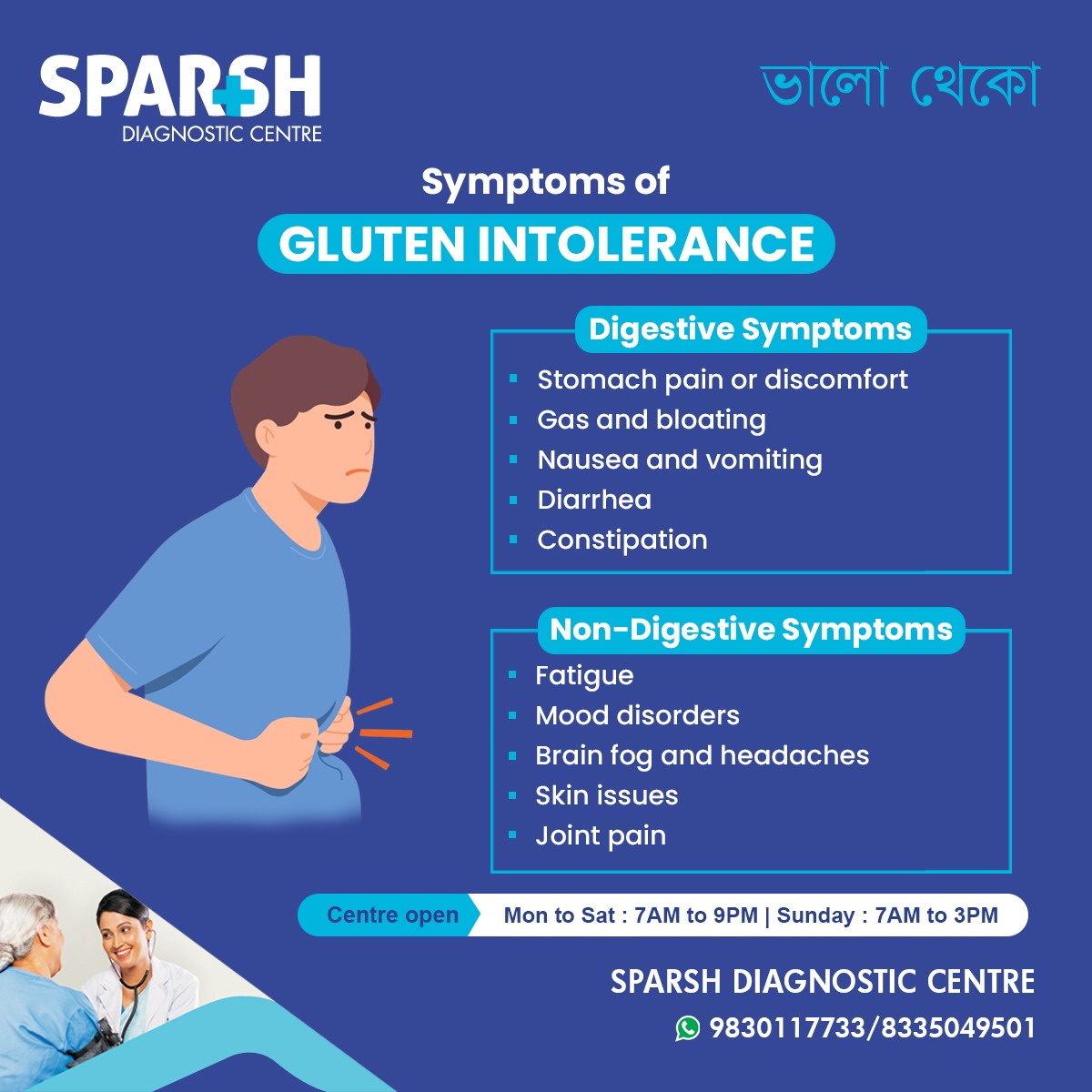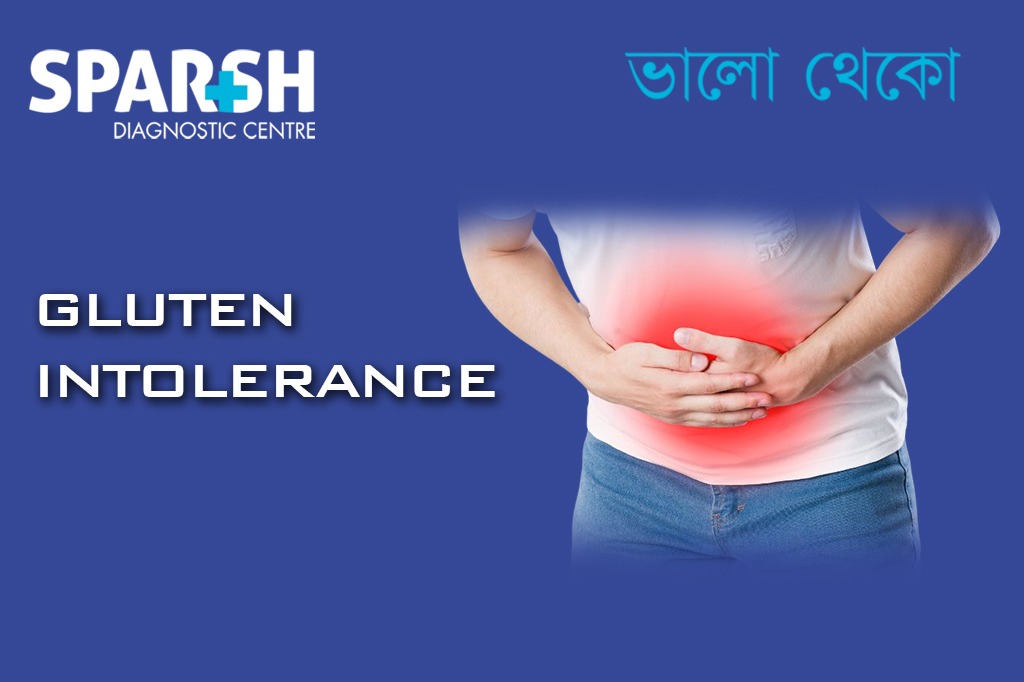In today’s world, digestive health concerns are on the rise, and one common issue people face is gluten intolerance. Many individuals complain of bloating, stomach pain, fatigue, or skin issues after eating foods containing wheat, barley, or rye. While some dismiss these symptoms as minor indigestion, they could actually be signs of gluten intolerance.
If left unmanaged, gluten intolerance can affect digestion, nutrient absorption, energy levels, and even mental health. Early diagnosis and lifestyle modifications are crucial for improving quality of life.
This comprehensive blog will cover:
What gluten intolerance is
The difference between gluten intolerance, wheat allergy, and celiac disease
Common digestive and non-digestive symptoms
Causes and risk factors
Diagnostic tests
Treatment and dietary management
Lifestyle tips for living gluten-free
What is Gluten Intolerance?
Gluten intolerance, also known as non-celiac gluten sensitivity (NCGS), is a condition where the body reacts negatively to gluten, a protein found in wheat, barley, and rye. Unlike celiac disease, gluten intolerance does not involve an autoimmune reaction that damages the small intestine. However, it still causes a wide range of uncomfortable digestive and non-digestive symptoms.
Gluten intolerance is often confused with celiac disease or wheat allergy, but these conditions are different:
Celiac Disease: An autoimmune disorder where gluten damages the intestinal lining.
Wheat Allergy: An allergic reaction to proteins found in wheat, which can cause skin rashes, breathing issues, or anaphylaxis.
Gluten Intolerance: A sensitivity to gluten that leads to digestive issues and other symptoms, but without autoimmune damage or allergic reactions.
Symptoms of Gluten Intolerance
Symptoms can vary from person to person. They are broadly categorized into digestive and non-digestive symptoms.
Digestive Symptoms
Non-Digestive Symptoms
Mood disorders (anxiety, depression, irritability)
If you notice recurring digestive discomfort or unexplained fatigue after eating gluten-containing foods, it may be time to consult a Gastroenterologist.

Causes and Risk Factors
The exact cause of gluten intolerance is still not fully understood, but certain factors increase the likelihood:
Genetics: Family history of gluten sensitivity or celiac disease.
Gut Health Issues: Imbalance in gut microbiota or prior digestive infections.
Immune System Response: An abnormal immune reaction to gluten proteins.
Other Health Conditions: Autoimmune disorders, thyroid disorders, and irritable bowel syndrome (IBS) may increase the risk.
Complications if Left Untreated
Ignoring gluten intolerance can lead to:
Nutritional deficiencies (iron, folate, vitamin B12)
Chronic fatigue
Skin conditions
Increased risk of irritable bowel syndrome
Mental health challenges such as depression or anxiety
Diagnosis of Gluten Intolerance
Diagnosis can be challenging because its symptoms overlap with many other conditions, including IBS, lactose intolerance, and celiac disease.
Common diagnostic steps include:
Medical History & Symptom Analysis: Your doctor will evaluate your symptoms, family history, and diet.
Blood Tests: To rule out celiac disease or deficiencies.
Endoscopy & Biopsy: Sometimes done to exclude celiac disease.
Elimination Diet: The most common approach—removing gluten from the diet to check if symptoms improve.
At Sparsh Diagnostic Centre, advanced pathology services ensure accurate diagnosis to help differentiate gluten intolerance from other conditions.
Treatment and Management of Gluten Intolerance
Currently, the only effective treatment is a gluten-free diet. Unlike medications, diet management plays the central role in controlling symptoms.
Foods to Avoid
Wheat (bread, pasta, pastries, biscuits)
Barley (malt, beer, soups)
Rye (rye bread, rye beer)
Processed foods containing gluten additives
Gluten-Free Alternatives
Rice, corn, quinoa, and millet
Gluten-free oats
Fresh fruits and vegetables
Pulses, nuts, and seeds
Lean meat, fish, and dairy (if tolerated)
Lifestyle Tips for Gluten-Free Living
Read Food Labels Carefully: Gluten is often hidden in sauces, soups, and packaged foods.
Plan Meals in Advance: Helps avoid accidental gluten exposure.
Consult a Nutritionist: To ensure balanced nutrition.
Regular Check-ups: Periodic tests such can monitor overall health.
Stay Hydrated: Helps ease digestion and reduce bloating.
Living with Gluten Intolerance
Adapting to a gluten-free lifestyle may feel challenging at first, but with time it becomes manageable. Many supermarkets and restaurants now offer gluten-free options. Support groups and online communities can also provide recipes and guidance.
If you continue to experience symptoms despite avoiding gluten, consult a gastroenterologist.
Frequently Asked Questions (FAQ)
1. Is it the same as celiac disease?
No. Celiac disease is an autoimmune condition that damages the intestine, while gluten intolerance causes discomfort without intestinal damage.
2. Can it cause weight gain?
Yes. Some people may gain weight due to inflammation and poor digestion, while others may lose weight due to nutrient malabsorption.
3. How is it diagnosed?
Diagnosis is usually based on symptoms, blood tests, and improvement on a gluten-free diet. Visit Sparsh Diagnostic Centre for accurate diagnostic testing.
4. Can children have gluten intolerance?
Yes. Children may develop gluten sensitivity, showing symptoms like bloating, diarrhea, irritability, or fatigue.
5. Are oats safe for people with gluten intolerance?
Pure oats are naturally gluten-free, but they are often contaminated during processing. Look for “certified gluten-free” oats.
6. Do I need to avoid all grains if I’m gluten intolerant?
No. Grains like rice, corn, millet, and quinoa are safe and nutritious gluten-free alternatives.
7. Can gluten intolerance cause skin problems?
Yes. Many people with gluten intolerance experience eczema, rashes, or acne-like breakouts.
Gluten intolerance can significantly impact daily life if left unmanaged. Recognizing the symptoms early, undergoing diagnostic tests, and following a strict gluten-free diet are key steps to recovery.
By making informed choices and working with healthcare professionals, you can lead a healthy, symptom-free, and fulfilling life despite gluten intolerance.
#BhaloTheko
Disclaimer:
No content on this site, regardless of date, should ever be used as a substitute for direct medical advice from your doctor or other qualified clinician.

![]()






[…] Gluten sensitivity: Especially in celiac disease […]
[…] Food intolerance – Lactose intolerance, gluten sensitivity […]
[…] to digestive discomfort, fatigue, or medical conditions. However, there is often confusion between gluten intolerance vs celiac […]